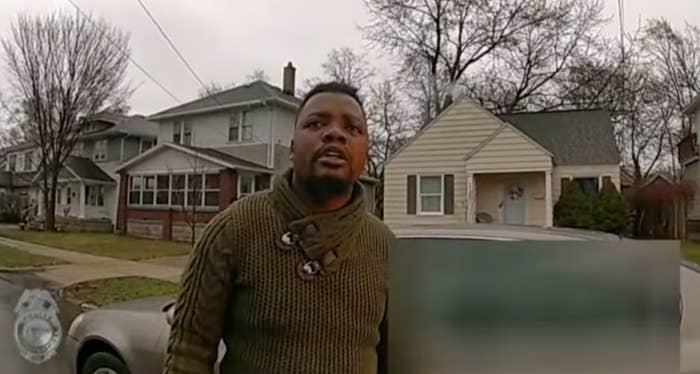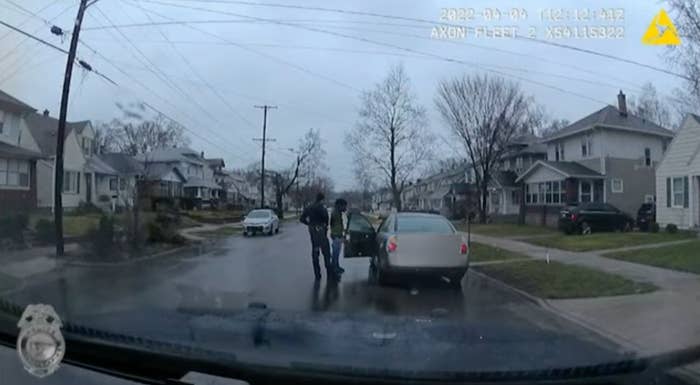
A Michigan police officer fatally shot a Black man in the head while kneeling on his body after pulling him over for a traffic stop, video released by police on Wednesday showed.
Patrick Lyoya, 26, was killed by a Grand Rapids police officer on the morning of April 4 after what police Chief Eric Winstrom had previously described as a "lengthy struggle." Per city policy, Michigan State Police are investigating the shooting. The officer, whose name has not been released, has been placed on paid leave and stripped of his police powers pending the outcome of the investigation.
"This is a difficult day," Winstrom told reporters on Wednesday as he released four videos of the incident, including footage from the officer's body-worn camera, his car's dash camera, a home surveillance camera, and a cellphone video. "My heart goes out to the family of Patrick Lyoya."
According to police, the officer initiated the traffic stop that ended in Lyoya's death at about 8:11 a.m. after observing that the car he was driving had "an improper Michigan registration."
After pulling over the vehicle on the side of a residential street, Lyoya got out, the videos show. The officer then told Lyoya repeatedly to "stay in the car."
"Get in the car. Dude, I’m stopping ya," the officer says, according to the body-worn camera video. "Do you have a license? Do you have a license?"
In the footage, Lyoya looks confused and appears to ask what he did. The officer seems not to understand him and asks, "Do you speak English?" Lyoya responds, "Yes." The officer then tells him that the license plate "does not belong on this car" and asks him to get his driver's license.
Lyoya then opens the driver's side door and briefly talks to an unidentified passenger before shutting the door. He then starts walking in front of the car and the officer follows him saying, "No, no, no. Stop. Stop," before grabbing Lyoya by his shoulder, the video shows.

Lyoya then pulls away and runs through the street and onto the sidewalk before the officer tackles him to the grass in front of a house, according to the footage. The officer repeatedly yells at Lyoya to "stop" and put his hands behind his back. Lyoya yells "OK" multiple times as the two appear to struggle.
They eventually get to their feet, and the officer tells Lyoya to "stop resisting." Lyoya is then seen in the body camera footage stepping away as the officer grabs hold of the green sweater he is wearing. The officer then shows his Taser. Lyoya appears to ask what he is doing and then grabs the Taser. Both fall back to the ground, and the officer tells Lyoya to let go of the Taser.
As the struggle continues, Lyoya is seen in the cellphone video, which was recorded by the passenger of his car, lying on his stomach with the cop on top of him. Lyoya appears to be trying to push up off the ground when the officer removes his gun from its holster and fires one round toward the back of Lyoya's head. Straddling Lyoya's motionless body, the officer yells at the passenger to "get back" and then reports on his radio that he was involved in a shooting.
Lyoya's family has likened his killing to an execution, telling reporters ahead of the videos' release that they want the world to see how he was killed.
“I could not watch that video twice. I cried,” said Israel Siku, a Swahili interpreter for the family, according to MLive.
Hundreds of people took to the streets to call for justice for Lyoya on Wednesday evening after the videos were released.
HAPPENING NOW: Hundreds gather outside the Grand Rapids Police Department to protest the shooting of 26-year-old Patrick Lyoya. Police released videos of the deadly police shooting earlier today. @wwmtnews
Civil rights attorney Ben Crump, who plans to hold a press conference with Lyoya's family on Thursday, said in a statement that Lyoya immigrated to the US from the Democratic Republic of the Congo in search of the American dream and to "provide a better and safer life for himself and his family." Lyoya was a father to two young children, his family said.
"The video clearly shows that this was an unnecessary, excessive, and fatal use of force against an unarmed Black man who was confused by the encounter and terrified for his life," Crump said, adding that Lyoya "never used violence against this officer even though the officer used violence against him in several instances for what was a misdemeanor traffic stop."
Crump said the family is demanding that the officer be fired as well as arrested and prosecuted for killing Lyoya.
The police chief said that due to the state police's ongoing investigation, he would not be drawing any conclusions at this time about whether the officer violated the department's use of force policy or committed any crimes. But when asked whether the use of a Taser against an officer would constitute the potential of "great bodily harm" that may warrant the officer to use deadly force, Winstrom said it could be.
"That's a complicated question," he said during the press conference Wednesday. "It would have the potential to cause great bodily harm, but not necessarily, and that's depending on all the facts of the case."
It's unclear from the videos whether Lyoya ever had full control of the Taser. Later in the struggle, the officer's body-worn camera turned off, likely due to the pressure of Lyoya's body or of some other object, Winstrom said.
The officer's Taser and his firearm were the only weapons identified at the scene. The Taser was deployed twice but did not make contact with anyone, the chief said.
In a statement posted on Twitter, Michigan Lt. Governor Garlin Gilchrist said he was "heartbroken" over Lyoya's killing.
"Black people in Grand Rapids, in Michigan, and across the country are mentally, emotionally, and physically exhausted from generations of struggle," Gilchrist said, as he called on people to "recommit" themselves to creating an equal and just society "where every interaction within our community, especially those with law enforcement, end with everyone able to return home to their families without harm.
"It is critical now to conduct a thorough and transparent investigation to achieve justice, deliver accountability, and understand what happened, for Patrick Lyoya's family as expeditiously as possible," he continued.
NAACP President Derrick Johnson called Lyoya's killing "horrifying, heartbreaking, and deeply frustrating," especially in light of Congress's failure to pass the George Floyd Justice in Policing Act. The legislation aimed to combat police brutality and better hold police accountable for their actions.
"An unregistered license plate should not be a death sentence," Johnson said in a statement. "Another Black man has died at the hands of police, and the officer in this video has got to be held accountable."
Winstrom declined to make a connection between Lyoya's death and the killing of Floyd, whose murder by a Minneapolis police officer who used a knee chokehold on him in May 2020 sparked massive global protests against police brutality.
"I view it as a tragedy," he said. "The loss of life in any circumstance is sad, and when I know that it's going to impact our city like this, it was more sad."
